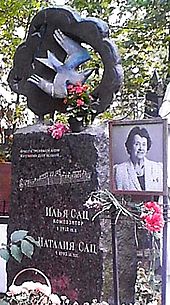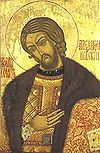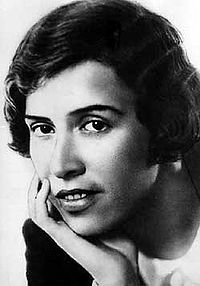- Natalya Sats
-
Natalya Sats (sometimes spelled Natalia Saz; Russian: Наталия Ильинична Сац; 14 August 1903 – 18 December 1993) was a Russian music teacher and director of the Moscow Musical Theater for Children, now named after her. Having been a victim of Soviet repressions, she pioneered the theater for children in Russia and received numerous awards for her work.
Contents
Biography
Sats was born August 27, 1903 in Irkutsk, Imperial Russia, where her father, Ilya Sats, was in political exile. Ilya Sats was a composer, who grew up in a Jewish family. He was a friend and protege of Leo Tolstoy. Her mother, née Anna Shchastnaya, was a singer and a daughter of a Ukrainian general. Although the parents met in Montpellier, they got married in Irkutsk, only after Natalya was born.[1] The family moved to Moscow in 1904, when Ilya Sats became music director of the Moscow Art Theatre (MAT). After the October Revolution in 1917, Commissar of Education Anatoly Lunacharsky proposed to start a theater for the children and the MAT director Konstantin Stanislavsky recommended 15 y.o. Natalya Sats.[2] After many stage successes, she received both Russian and international recognition. In 1931 conductor Otto Klemperer invited her to stage Wolfgang Mozart's The Marriage of Figaro in Buenos Aires, and Giuseppe Verdi's Falstaff in Berlin.[3] Using her friendship with Sergei Prokofiev, she commissioned him to write Peter and the Wolf, which she premiered May 2, 1936. This play has received a wide international success, was recorded over 400 times, and translated to a number of languages.
In 1937, after the US ambassador attended one of her shows, she was arrested and taken to the Lubyanka prison. She refused to sign a confession, and was only sentenced to 5 years of labor camp in Siberia. At the end of her sentence, she was not allowed to return to Moscow, and moved to Alma-Ata (now Almaty, Kazakhstan). There, she started a new theater for the children, which she directed for 13 years. After Joseph Stalin's death in 1953, Sats was fully rehabilitated and returned to Moscow in 1958. With the support of Russian cultural elite, she demanded to be given an opportunity to start a new theater for the children. After seven years, in 1965, Musical Theater for Children opened its doors. With her troupe, she traveled the world, performing in many countries and languages. She also wrote three books, including a two-volume autobiography Sketches from My Life, translated into English in 1985.
For her work, Sats received numerous awards, including USSR State Prize (1972), People's Artist of the USSR award (1975), Lenin Prize (1982), Hero of Socialist Labor medal (1983), and Lenin Komsomol Prize (1985). She was elected a member of USSR Union of Writers in 1962.
Sats died 18 December 1993, and was buried at the Novodevichy Cemetery in Moscow next to her father. The Musical Theater for Children and the State Theater for Children in Almaty were then renamed in her honor. Sats' daughter, Roksana Sats, continues her work in the theater.[4]
 Natalya Sats's gravestone at the Novodevichy Cemetery in Moscow.
Natalya Sats's gravestone at the Novodevichy Cemetery in Moscow.
Notes
- ^ Natalya Sats Biography, Chapter 1.
- ^ See Find A Grave biography
- ^ See Find A Grave biography
- ^ 40th anniversary of the theater (in Russian)
References
- Natalya Sats, Sketches from My Life, vol 1, 1984.
- Biography (in Russian)
- Natalya Sats, a biography written by Robert Edwards on the Find A Grave website.
- Peter & The Wolf [VHS], Proscenium Entertainment, released February 26, 1996.
External links
- Natalya Sats, 90, Dies; Children's Opera Head, obituary in The New York Times, December 22, 1993.
- Natalia Sats--Triumph of the Human Spirit, an essay.
- Short biography of Natalia Sats, on the Natalya Sats Musical Theater website.
People from Russia Leaders and religious - Pre-1168
- 1168–1917
- 1922–1991
- 1991–present
- RSFSR leaders
- General secretaries
- Soviet premiers (1st deputies)
- Soviet heads of state (and their spouses)
- Prime ministers (1st deputies)
- Foreign ministers
- Prosecutors general
- Metropolitans and patriarchs
- Saints

Military and explorers - Field marshals
- Soviet marshals
- Admirals
- Aviators
- Cosmonauts
Scientists and inventors - Aerospace engineers
- Astronomers and astrophysicists
- Biologists
- Chemists
- Earth scientists
- Electrical engineers
- IT developers
- Linguists and philologists
- Mathematicians
- Naval engineers
- Physicians and psychologists
- Physicists
- Weaponry makers
Artists and writers Sportspeople - Chess players
Categories:- Musical theatre directors
- Russian and Soviet theatre directors
- Russian dramatists and playwrights
- Russian Jews
- Heroes of Socialist Labour
- People's Artists of the USSR
- USSR State Prize winners
- Lenin Prize winners
- Burials at Novodevichy Cemetery
- People from Irkutsk
- People from Moscow
- 1903 births
- 1993 deaths
Wikimedia Foundation. 2010.

